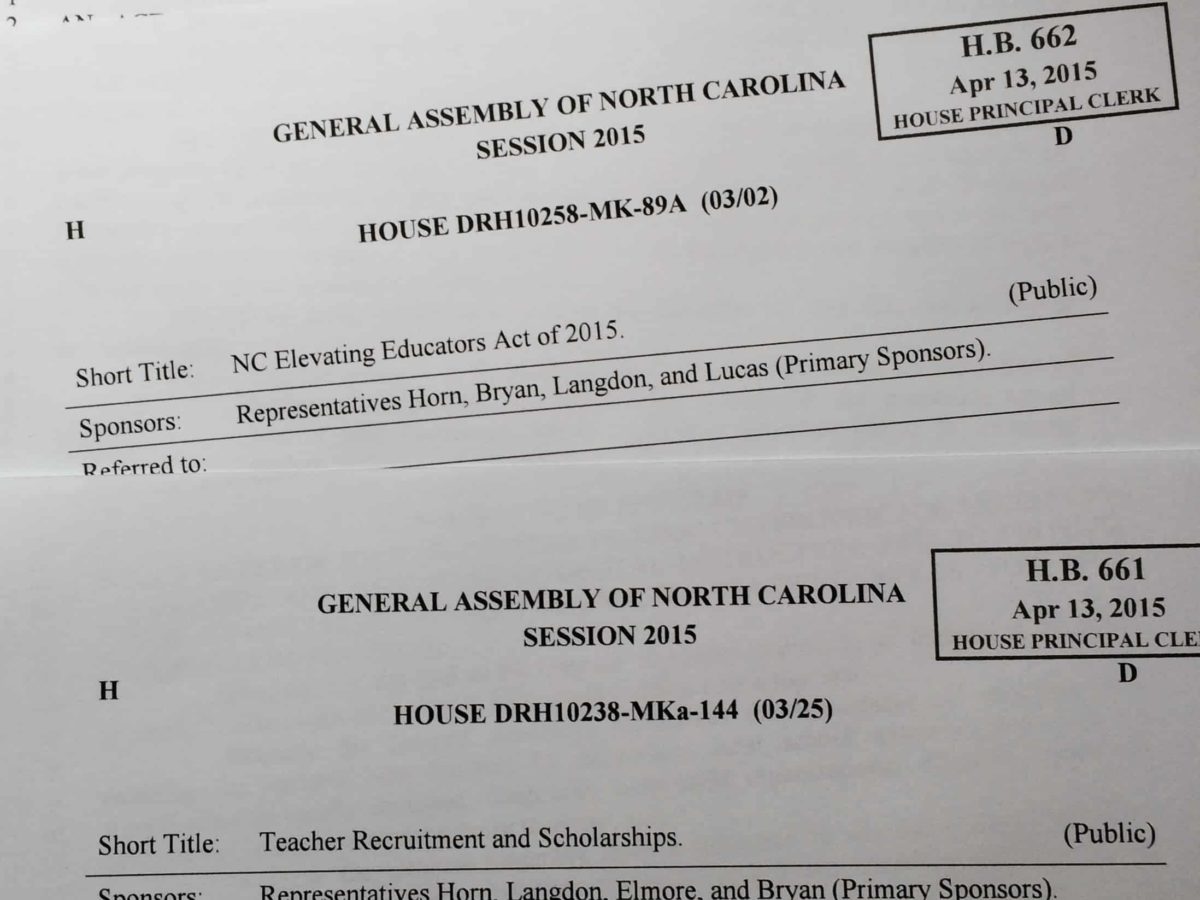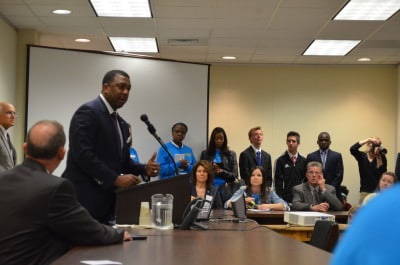

UPDATE: All four bills passed the House K-12 Education Committee with a favorable report. Click on the bills to see their history: HB 660, HB 661, HB 662, HB 902
The next 10 days are going to be busy ones at the North Carolina General Assembly as we move toward the crossover deadline on Thursday, April 30 — that’s when most bills need to have passed one house to continue to be in play this session.
Four bills filed last week would transform the landscape of K-12 education in North Carolina.
EdNC will be providing updates on these bills as they move through the committees and chambers.
House Bill 660 — Transition to Personalized Digital Learning
AN ACT TO FURTHER THE TRANSITION TO PERSONALIZED DIGITAL LEARNING IN ALL NORTH CAROLINA K-12 PUBLIC SCHOOLS; TO TRANSITION FROM TEXTBOOKS TO DIGITAL MATERIALS FOR ALL LEARNERS; AND TO REQUIRE THE STATE BOARD OF EDUCATION TO DEVELOP AND IMPLEMENT DIGITAL TEACHING AND LEARNING STANDARDS FOR TEACHERS AND SCHOOL ADMINISTRATORS.
HB 660 was introduced on April 13, 2015. The primary sponsors are Reps. Craig Horn (R-Union), Jason Saine (R-Lincoln), Charles Jeter (R-Mecklenburg), and John Fraley (R-Iredell). Twenty-seven more legislators of both parties sponsored the bill.
The bill has been referred to the K-12 education committee.
The transition to digital learning will impact all aspects of education, including course content, teaching methods, when and where learning takes place, the resources required, and how success is defined and measured.
This bill would 1) expand school connectivity, 2) establish collaborative procurement, 3) expand access to digital learning resources, and 4) provide professional development for education leaders.
The bill directs the State Board of Education to establish a grant program to support digital learning innovations.
The bill directs the State Board of Education to contract with the Friday Institute for Educational Innovation to establish the North Carolina Digital Learning Initiative.
The bill is subject to the availability of funds.
Other information: A final report from the Friday Institute on digital learning in North Carolina is due on August 1, 2015. Here is more information about the state’s digital learning plan.
Highlight: As the bill notes, “investments in infrastructure, digital content, and educator capacity development will be required and will yield long-term returns on investments in terms of educational outcomes, increased graduation rates, and college and career readiness.”
House Bill 661 — Teacher Recruitment and Scholarships
AN ACT TO TRANSFORM EDUCATOR PREPARATION IN THIS STATE.
HB 661 was introduced on April 13, 2015. The primary sponsors are Reps. Craig Horn (R-Union), James Langdon (R-Johnston), Jeffrey Elmore (R-Wilkes), and Rob Bryan (R-Mecklenburg). Forty more legislators of both parties sponsored the bill.
The bill has been referred to the K-12 education committee, and if it receives a favorable report, then it will move to appropriations.
This bill establishes a program to prepare extraordinary teachers each year to serve in hard-to-staff schools and positions.
The State Educational Assistance Authority shall recruit and award $8,500/year scholarships. Three groups of individuals are targeted: 1) high school seniors in North Carolina who want to enroll in a traditional educator preparation program, 2) students enrolled in community college pursuing a degree in a hard-to-staff field, and 3) working professionals with expertise in hard-to-staff subject areas in an independent nonprofit educator preparation program. The loans are forgiven in seven years after graduation if the recipient enters the teaching profession in a hard-to-staff school and teaches for at least four years.
The State Board of Education is directed to identify hard-to-staff schools and positions annually.
The bill appropriates $1,000,000 for FY 2015-16 and $1,000,000 for FY 2016-17 to establish this program. The bill authorizes SEAA to spend up to $200,000 of the appropriation on administration.
Highlight: This bill is based on “[r]esearch demonstrating the pivotal importance of highly effective teachers in preparing every North Carolina student for success in college and careers…. A crucial piece of providing an excellent educator for every student is a program dedicated to aggressive recruitment of top educator candidates, rigorous preparation, and incentives for teachers to serve in hard-to-staff schools and positions.”
House Bill 662 — NC Elevating Educators Act of 2015
AN ACT TO ESTABLISH A MULTI-YEAR PROGRAM TO PROVIDE FOR EXCELLENT TEACHERS AND HIGH-QUALITY DIGITAL INSTRUCTION; AND TO PROVIDE FOR FINANCIALLY STABLE ADVANCED TEACHING ROLES FOR K-12 CLASSROOM TEACHERS.
HB 662 was introduced on April 13, 2015. The primary sponsors are Reps. Craig Horn (R-Union), Rob Bryan (R-Mecklenburg), James Langdon (R-Johnston), and Marvin Lucas (D-Cumberland). Thirty-seven more legislators of both parties sponsored the bill.
The bill has been referred to the K-12 education committee.
This bill directs the State Board of Education to contract with a nonprofit to administer a program where school districts implement advanced teaching roles and pay systems for classroom teachers. In addition to base salary and local supplements, teachers would receive additional compensation based on effectiveness and additional responsibilities in teaching more students. The additional compensation would range between 3 and 30 percent of the statewide average salary of classroom teachers, and it would be paid by districts by reallocating recurring local, state, or federal funds.
The first cohort of up to 10 local school administrative units will be identified by December 1, 2015. A second cohort of up to 50 local units will be identified before the 2017-18 school year if funds are available. The goal is for 90 percent of schools statewide to participate by 2019-20.
The bill provides funding to the nonprofit to administer the program but the supplements would be paid by school districts.
The bill is subject to the availability of funds.
Highlight: “[I]t is the goal of the General Assembly to provide all students in the State of North Carolina with an excellent, high-quality public education, and … the General Assembly recognizes the importance of attracting and retaining the nation’s best teachers by supporting local school administrative units in transitioning to locally designed, financially sustainable organizational structures, including professional compensation models for teachers….”
House Bill 902 — Transforming Principal Preparation
AN ACT TO ESTABLISH A COMPETITIVE GRANT PROGRAM TO ELEVATE EDUCATORS IN NORTH CAROLINA BY TRANSFORMING THE PREPARATION OF SCHOOL PRINCIPALS.
HB 902 was introduced on April 15, 2015. The primary sponsors are Reps. Hugh Blackwell (R-Burke), Craig Horn (R-Union), Rob Bryan (R-Mecklenburg), and Edward Hanes (D-Forsyth). Twenty-eight more legislators of both parties sponsored the bill.
The bill has been referred to the K-12 education committee, and if it receives a favorable report, then it will move to appropriations.
This bill establishes a competitive grant program administered by the State Education Assistance Authority in cooperation with a nonprofit to identify entities to prepare and support highly effective school principals in North Carolina. The entities can be for-profit, nonprofit, or an institution of higher education, but the entities must have an evidence-based plan to prepare school leaders who implement school leadership practices linked to increased student achievement. Grants to the entities will last up to five years with possible renewal.
The bill appropriates $500,000 in 2015-16 for SEAA to contract with the nonprofit to establish and administer the program and $9,500,000 in 2016-17 for SEAA to contract with the nonprofit to administer the program and award grants.
Highlights: Principal competencies are identified, including evidence of significant positive effect on student learning growth in the classroom and at the school-level, evidence of problem solving and critical thinking skills, achievement drive, and leadership of adults. The program will be aligned to high-quality national standards for school leadership development. Principals will be exposed to rigorous coursework that effectively links theory with practice through the use of field experiences and problem-based learning. There will be multiple opportunities for observation and coaching of principals. There is a process for continuous review and program improvement.


